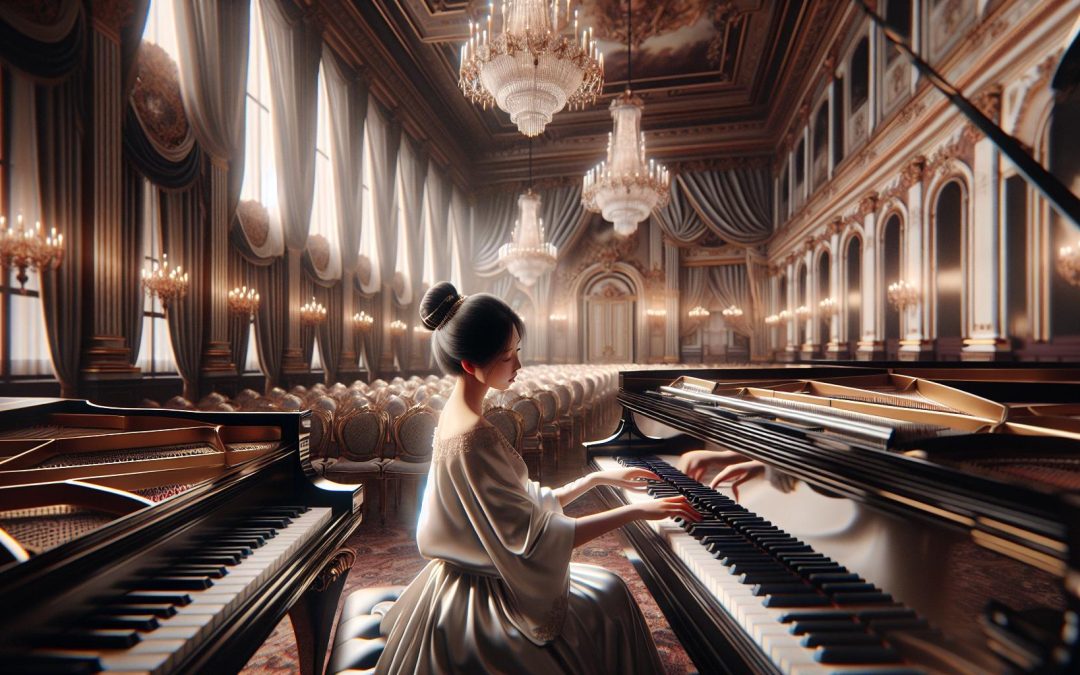Choosing the right piano keyboard can be a game-changer for any classical pianist. It's not just about the keys and sounds, it's about the feel, the touch, and the connection that a pianist develops with their instrument.
There's a sea of options out there, from digital keyboards to grand pianos, each boasting unique features and qualities. It can be a daunting task to find the perfect fit, especially for classical pianists who need an instrument that'll truly capture the depth and nuances of their music.
This article aims to help classical pianists navigate through these options, providing a comprehensive guide to the best piano keyboards in the market. It's intended to simplify the process and ensure that every pianist finds an instrument that resonates with their style and enhances their performance.
Key Considerations for Classical Pianists
A myriad of factors come into play when selecting the ideal piano keyboard for a classical pianist. Mind you, it's not just about finding a functional instrument, it's about discovering a trusty partner for emotional journey and expression.
Touch Sensitivity might be the first thing a classical pianist should look for in a keyboard. It enables pianists to vary their playing style and create nuances in their performances. When a keyboard has high touch sensitivity, it responds differently to varying degrees of force. This feature is essential for classical music which often requires rapid shifts from soft, gentle pieces to powerful, booming notes.
Next, Weighted Keys provide a realistic piano playing experience. They're designed to mimic the resistance and rebound of a traditional grand piano. An instrument with weighted keys can prepare a passing beginner for an eventual upgrade to an acoustic piano. It's also perfect for an experienced pianist who might prefer a more authentic feel.
Of course, we can't talk about keyboards without mentioning Sound Quality. A good classical music keyboard will produce sounds that are almost indistinguishable from an acoustic piano. Top-notch keyboards even offer hundreds of different tones and sounds.
The keyboard's Build Quality and Design Aesthetics should also not be overlooked. A well-built keyboard will stand up to the rigors of heavy use while maintaining precision and responsiveness.
Moreover, for those who love to take their music on the go, Portability can be a defining factor. Some keyboards are designed with portability in mind, being lightweight and compact.
These crucial elements form a part of the decision-making puzzle when it comes to choosing a piano keyboard. Each pianist's interpretation of these factors may be unique, based on their personal style, training background, and goals as a musician. Nonetheless, by understanding the importance of each of these considerations, the task of finding the right instrument becomes a more informed and enjoyable journey.
Digital Keyboard vs Grand Piano: Pros and Cons

When considering the best piano keyboard for classical pianists, it's often a toss-up between the digital keyboard and the grand piano. Differences in portability, price, maintenance, and the overall playing experience separate the two. These variations can greatly affect a classical pianist's playing style, performance, and satisfaction. Let's dive deeper into the pros and cons of each.
Digital Keyboard
The benefits of a digital keyboard include:
- Portability and Convenience: A digital keyboard is lightweight, easy to transport, and perfect for on-the-go musicians.
- Budget-Friendly: They're generally less expensive than grand pianos, making them a fantastic choice for those on a budget.
- Ease of Maintenance: Digital keyboards require minimal upkeep, unlike grand pianos that might need regular tuning and cleaning.
However, the drawbacks of a digital keyboard are:
- Lack of Authenticity: While they're getting better, digital keyboards can't perfectly replicate the sound and touch of an acoustic piano.
- Dependency on Electricity: You'll always need electricity or batteries to play which might limit where and when you can practice.
Grand Piano
A grand piano has several advantages:
- Exceptional Sound Quality and Touch Sensitivity: Grand pianos are renowned for their unmatched sound quality and touch sensitivity, offering the most authentic piano experience.
- Elegance and Aesthetic Appeal: They're quite a sight to behold and can significantly enhance any room's aesthetics.
Nonetheless, here are some disadvantages of a grand piano:
- Pricey and High Maintenance: Grand pianos are quite expensive and require consistent maintenance.
- Lacks Portability: Due to their size and weight, moving them can be a challenge.
In the end, it comes down to personal preference and specific needs. A classical pianist might find a grand piano more appealing for its authenticity and sound quality. On the contrary, a traveling musician or a hobbyist might appreciate the convenience, portability, and affordability of a digital keyboard. The key lies in understanding one's preferences, style, expectations, and constraints to make an informed choice. The ideal instrument ultimately enhances a musician's performance and enjoyment, becoming their perfect musical companion.
Top Features to Look for in a Piano Keyboard

When hunting for the perfect piano keyboard, there are a handful of must-have features that can make all the difference in a classical pianist's performance.
One of the biggies is touch sensitivity. You've gotta have a keyboard that responds in volume based on how gently or forcefully the keys are struck. It's a critical factor that brings out the nuances and dynamic range in a piece of music.
Next up, we have weighted keys. These simulate the resistance you'd feel on an acoustic piano. With weighted keys, pianists can perform intricate pieces full of subtleties and emotion, giving an authentic feel to their performance.
Sound quality can't be overlooked either. High-quality sound sampling tech is a must in today's keyboards. Imagine playing Chopin's nocturne and hearing the rich, deep bass tones ring out, clear and unmodified. Nothing beats that.
Then we need to talk about build quality. It's essential to go for a keyboard that can stand the test of time. That one that has a robust build, handles the rigors of constant use, and boasts a sturdy keybed.
Let’s not forget about design aesthetics. While it might not affect the sound, a well-designed, eye-catching keyboard can undoubtedly up the comfort quotient and inspire pianists.
Convenience is king, so portability is a key consideration. If you're a gigging musician or a pianist who lives in a small flat, you'd appreciate a light, compact, and easy-to-move keyboard.
So, to sum it up:
- Touch sensitivity
- Weighted keys
- Sound quality
- Build quality
- Design aesthetics
- Portability
Best Piano Keyboards for Classical Pianists

When it comes to selecting a keyboard for a classical pianist, it's not just about the price tag or brand. The essential features mentioned earlier, like touch sensitivity, weighted keys, sound quality, and more, need to be taken into consideration. To aid in the decision-making process, here are some keyboards that get top marks in these departments:
Yamaha P125 88-Key Weighted Action Digital Piano
With a sleek design, 88 different keys, and impressive sound quality, the Yamaha P125 checks all the boxes for a classical pianist. It's built like a tank, ensuring extended durability and resistance to wear and tear. Yamaha's attention to detail extends to the level of key resistance too, closely mimicking the feel of an actual piano.
Roland RD-2000 88-Key Digital Piano
Packed with innovative features and boasting of Roland's legendary build quality, the RD-2000 is perfect for those who value the nuance in their music. Its revolutionary V-Piano technology delivers unparalleled sound quality, while the weighted keys provide a very authentic feel. It's portable, giving it an edge in terms of convenience.
Kawai ES110 88-Key Digital Piano
The Kawai ES110 combines portability and performance brilliantly. This keyboard is highly rated for the realistic acoustic piano sound it delivers, thanks to its Harmonic Imaging sound technology. It's also praised for its Responsive Hammer Compact Action, which gives the keys a natural, weighted feel, akin to playing an acoustic piano.
It's worth noting that every pianist has their own style and personal taste, and what works well for one might not for another. That's why trying out several keyboards to see which one feels the best is the only tried and true approach. It's the pianist's unique connection with the instrument that can breathe life into the notes. Therefore, the perfect keyboard is one that feels just right.
Grand Pianos for Classical Performances

When it comes to grandeur and elegance in live performances, grand pianos take center stage. They're particularly adored by classical pianists for a multitude of reasons.
One vital aspect classical pianists appreciate in a grand piano is the superior sound quality. Grand pianos are built with an advanced sound projection system, generally consisting of a soundboard and acoustic chamber. This setup yields a resonant, vibrant, and authentic sound crafted for a concert hall environment. It delivers the depth and nuance vital to the dynamics of classical compositions.
Another significant feature is the touch sensitivity offered by a grand piano. The intricate mechanics of a grand piano, including its larger keys and longer strings, provide enhanced control over articulation and dynamics. This allows pianists to express their musical intentions with the finesse that classical pieces often demand.
Grand pianos truly shine with weighted keys. The keys' weightiness and subsequent hammer action allow the musician to experience a real feeling of primum mobile - the first cause or initial movement in the key's depression; critical in producing nuanced, controlled tones.
Though one has to handle the weight literally here, as these pianos are typically large, heavy, and aren't designed to be moved around frequently. Also, they come with a hefty price tag, which might be a significant constraint for some.
Given these aspects to consider, a few top-notch grand pianos that warrant attention from classical pianists include Steinway & Sons Model D, Yamaha CFX, and the Bosendorfer 290 Imperial. These finely crafted instruments exemplify the ultimate standard of sonority, delicate control, and majestic aesthetics necessary for any classical performance.
Choosing a grand piano for classical performances is no small decision. It involves a considerable investment of time, effort, and resources but brings forth a unique and unparalleled music-making experience that no digital keyboard can replicate.
Conclusion
Choosing the best piano keyboard for classical pianists isn't a one-size-fits-all situation. It's a delicate balance of touch sensitivity, sound quality, build quality, and aesthetics. And let's not forget the importance of portability for those who are always on the go. Digital keyboards tick many of these boxes and are a great option for those seeking convenience and affordability. But for those who crave authenticity and the unparalleled music-making experience, a grand piano is hard to beat. Brands like Steinway & Sons, Yamaha, and Bosendorfer offer top-notch grand pianos that are worth the investment. Ultimately, it's about finding that perfect instrument that resonates with your style and enhances your performance. So, whether it's a digital keyboard or a grand piano, the right choice is the one that brings you the most joy and satisfaction. Happy playing!
Harlan Kilstein began playing piano during covid with no piano background at all. He taught himself how to play learning what to do and what not to do.
Today he's an advanced intermediate player and can help you grow in your skills because he learned all this on his own.








